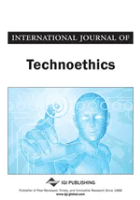
International Journal of Technoethics
Scope & Guideline
Bridging the gap between innovation and ethical responsibility.
Introduction
Aims and Scopes
- Ethical Implications of Technology:
The journal investigates the moral and ethical issues arising from the development and deployment of various technologies, including AI, social media, and autonomous systems. - Design and Innovation Ethics:
It emphasizes the importance of incorporating ethical considerations into the design and innovation process, advocating for methodologies like Value-Sensitive Design and Ethical Engineering. - Impact on Society and Governance:
The journal explores how technologies affect social structures, governance, and democratic processes, focusing on topics such as privacy, transparency, and accountability. - Interdisciplinary Approaches:
The publication encourages interdisciplinary research, drawing insights from philosophy, sociology, political science, and engineering to address technoethical dilemmas. - Cultural and Global Perspectives:
It considers the cultural contexts and global implications of technological innovations, examining how different societies navigate ethical challenges.
Trending and Emerging
- Ethical AI Practices:
There is a notable increase in research examining the ethical dimensions of artificial intelligence, particularly in practical applications and governance, highlighting the need for frameworks that ensure accountability and fairness. - Social Media Design and Democracy:
Emerging discussions on the intersection of social media design and democratic values indicate a growing concern about how technology influences political discourse and civic engagement. - Autonomous Systems and Control:
The cultural and ethical implications of autonomous technologies, especially in areas like autonomous driving, are becoming increasingly relevant as these technologies evolve and integrate into daily life. - Value-Sensitive Design Methodologies:
A rising emphasis on methodologies like Value-Sensitive Design reflects a broader movement towards integrating ethical considerations into the technological innovation process. - Public Policy and Technoethics:
There is an emerging focus on the relationship between public policy and technoethics, exploring how regulations can shape ethical practices in technology development and deployment.
Declining or Waning
- Radical Life Extension:
Discussions surrounding the ethics of radical life extension have become less frequent, possibly due to the complexity and controversial nature of the topic, which may have led to diminishing interest or saturation in the literature. - Cyberbullying and Hate Speech:
While still relevant, the frequency of publications specifically addressing cyberbullying and hate speech has decreased, suggesting that these issues may be considered more established or that researchers are shifting towards exploring broader implications of online behavior. - Simulation Hypotheses:
The exploration of moral considerations regarding simulation hypotheses, such as the ethics of artificial universes, appears to be waning, indicating a potential shift towards more practical applications of technoethics rather than speculative philosophical debates. - Machine Responsibility:
The discourse surrounding machine responsibility and accountability seems to be less prominent, which might indicate a focus shift towards more pressing ethical dilemmas directly impacting human lives and societal structures. - Epistemic Injustice in Engineering:
Research specifically addressing epistemic injustice within engineering and technological development has notably decreased, possibly reflecting a shift in focus towards more actionable frameworks for ethical practice.
Similar Journals
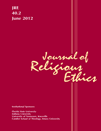
JOURNAL OF RELIGIOUS ETHICS
Contributing to Global Conversations on Religious EthicsJOURNAL OF RELIGIOUS ETHICS is a premier academic journal dedicated to fostering scholarly discourse within the field of religious studies, specifically focusing on moral theory and its implications in various religious contexts. Published by Wiley, the journal showcases rigorous research and theoretical exploration related to ethical dimensions of religion, contributing significantly to the broader understanding of moral philosophy. With an impressive 2023 impact factor placing it in the Q1 category of religious studies and a commendable Scopus rank of 126 out of 644, it is positioned amongst the top-tier journals in its field, reflecting its influence and the high quality of its manuscripts. The journal welcomes diverse perspectives and interdisciplinary approaches, making it an essential resource for researchers, educators, and practitioners seeking to deepen their understanding of the ethical implications of various religious traditions. Serving a global audience from its UK base, the JOURNAL OF RELIGIOUS ETHICS continues to be an indispensable platform for innovative scholarship and dialogue.

Journal of Ethics
Unraveling the Complexities of EthicsJournal of Ethics is a premier academic journal devoted to the exploration and analysis of ethical theories and practices within various disciplines. Published by SPRINGER in the Netherlands, this prestigious journal has established itself within the field of Philosophy, boasting a commendable Q1 classification in the 2023 category quartiles. With an impressive Scopus rank of 145 out of 806 in the Arts and Humanities sector, it occupies the 82nd percentile, indicating its significant impact and reach. The journal aims to provide a platform for rigorous discussion and research that addresses contemporary ethical issues, making it an essential resource for researchers, professionals, and students alike. Although not an Open Access journal, it offers various access options to ensure that critical insights and scholarly contributions are disseminated widely.
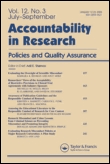
Accountability in Research-Ethics Integrity and Policy
Shaping the Future of Research Integrity and Policy.Accountability in Research: Ethics Integrity and Policy is a distinguished journal published by Taylor & Francis Inc, focusing on the critical intersection of research integrity and ethical practices within various disciplines. Established in 1989, this journal serves as a vital platform for advancing the understanding of accountability frameworks in research, particularly contributing to the fields of education, library sciences, and miscellaneous medicine. With a robust impact reflected in its Q1 ranking in Library and Information Sciences and its significant placements in Education and Medicine (Q2), the journal is highly regarded among researchers and practitioners alike. The journal's objective is to promote scholarly discourse on ethical integrity in research practices, making it an essential resource for academics, professionals, and students who wish to foster responsible research environments. Although it does not operate under an open access model, the journal's comprehensive methodology and insightful articles ensure that it remains influential in shaping the future of research accountability and ethics.

LAW AND PHILOSOPHY
Innovating the Dialogue between Law and PhilosophyLaw and Philosophy is a distinguished academic journal published by Springer, focusing on the intersection of legal studies and philosophical inquiry. With an esteemed impact factor reflecting its influence in the field, the journal has achieved notable ranks, placing it in Q2 in Law and Q1 in Philosophy as of 2023. Readers can access it through institutional subscriptions, emphasizing its role in enriching debates around law's philosophical underpinnings. This journal, with its inception in 1982 and continuing through 2024, provides a platform for innovative ideas, fostering dialogue among researchers, professionals, and students. It aims to publish cutting-edge articles that challenge existing doctrines and propose new theoretical frameworks, making it essential for anyone engaged in the critical study of law and its philosophical ramifications.

Journal of Academic Ethics
Exploring the Foundations of Integrity in AcademiaThe Journal of Academic Ethics, published by Springer, is a premier scholarly outlet dedicated to the exploration and analysis of ethical considerations across various disciplines, including philosophy, education, sociology, and the broader arts and humanities. With an ISSN of 1570-1727 and E-ISSN of 1572-8544, this journal has established itself as a vital resource since its inception in 2005, continuing to provide insightful contributions through 2024. Recognized for its impactful research, it holds esteemed positions in multiple Scopus categories, including a Q1 ranking in both Arts and Humanities (Philosophy) and a Q2 ranking in Education and Sociology. This highlights the journal's significance in fostering ethical discourse among researchers and practitioners alike. Although it does not currently offer open access, the journal's robust academic framework ensures high-quality contributions that advance knowledge and promote critical discussions about ethical practices in academia and beyond. For anyone engaged in ethical inquiries, the Journal of Academic Ethics serves as an indispensable platform for innovative research and scholarly dialogue.

International Journal of Ethics Education
Fostering Integrity in EducationIntroducing the International Journal of Ethics Education, a cutting-edge publication dedicated to the exploration and advancement of ethical practices in educational contexts. Published by SpringerNature, this journal serves as a pivotal platform for researchers, educators, and policymakers focusing on the critical intersection of ethics and education. With its commitment to academic rigor, the International Journal of Ethics Education provides peer-reviewed articles that foster dialogue and promote ethical frameworks that can be integrated within curricula globally. Although currently not an open-access journal, it grants access to vital research tailored for those passionate about cultivating integrity and moral reasoning in educational systems. The journal seeks to enhance understanding and implementation of ethical principles, making it an essential resource for professionals and students aiming to contribute positively to their fields.
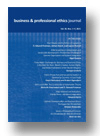
BUSINESS & PROFESSIONAL ETHICS JOURNAL
Fostering Insightful Conversations on Professional EthicsBUSINESS & PROFESSIONAL ETHICS JOURNAL, published by the Philosophy Documentation Center, serves as a premier platform for rigorous research and discourse in the realms of ethics surrounding business practices and professional conduct. Since its inception in 1979, this journal has consistently contributed to the field, encompassing vital discussions that influence ethical standards in business and economics. With a rich historical arch spanning various converged years, it has evolved to become a key resource, currently enjoying a Q4 ranking in Business and International Management and Q4 in Economics and Econometrics in 2023, alongside a strong standing in the philosophy category. While being non-open access, the journal remains an essential reference point for academics and practitioners seeking to navigate the complex ethical landscapes of their fields. As the discourse around business ethics gains importance, the journal positions itself as a critical venue for sharing innovative insights and solutions, making it an invaluable resource for researchers, professionals, and students alike.
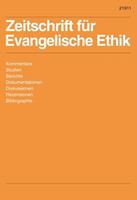
ZEITSCHRIFT FUR EVANGELISCHE ETHIK
Contributing to the Landscape of Religious EthicsZEITSCHRIFT FUR EVANGELISCHE ETHIK, published by WALTER DE GRUYTER GMBH, is a leading journal in the field of Religious Studies, noted for its critical examination of evangelical ethics and theological perspectives. With an ISSN of 0044-2674 and E-ISSN of 2197-912X, this journal serves as a pivotal platform for scholars seeking to explore contemporary issues through a rigorous ethical lens. Based in Germany, it engages readers with a rich tapestry of interdisciplinary insights, contributing significantly to ongoing discussions within the realm of religious ethics. The journal enjoys a commendable position in the Scopus rankings, placed in the Q3 quartile and ranking #476 out of 644 in its category, reflecting its dedication to quality scholarship. Spanning over two decades, with converged years from 2002 to 2024, it fosters valuable dialogues between researchers, professionals, and students alike. Although not Open Access, the journal's subscription options ensure accessibility to essential scholarly works that can impact both academic and practical applications in religious thought.
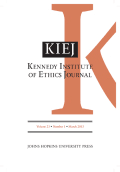
KENNEDY INSTITUTE OF ETHICS JOURNAL
Advancing Discourse on Ethics and Health SciencesThe KENNEDY INSTITUTE OF ETHICS JOURNAL, published by the prestigious Johns Hopkins University Press, stands as a leading periodical in the realm of ethics, particularly emphasizing the intersection of health policy, social sciences, history, and philosophy of science. With an ISSN of 1054-6863 and an E-ISSN of 1086-3249, this journal has been a cornerstone of ethical discourse since its inception in 1991. Renowned for its rigorous peer-review process, the journal boasts impressive rankings, including Q1 in History and Philosophy of Science and Q2 in Health (Social Science) for 2023. Researchers, professionals, and students alike will find this journal invaluable for navigating complex ethical issues, providing a platform for innovative research and discourse. Although currently not offering Open Access, its contributions to the fields of ethics and legal aspects of health are profound, making it an essential resource for those engaged in these critical discussions.

Journal of Practical Ethics
Innovating Solutions to Real-World DilemmasJournal of Practical Ethics is an esteemed open-access journal published by the Oxford Uehiro Centre for Practical Ethics, dedicated to enhancing the discourse surrounding ethical issues in various fields, including healthcare, technology, and social policy. Since its inception in 2013, the journal has fostered a robust academic platform for researchers, professionals, and students to explore and publish innovative ideas and solutions to real-world ethical dilemmas. The journal's commitment to making research freely accessible emphasizes its role in bridging the gap between academic inquiry and practical application, thereby encouraging a broader engagement with ethical considerations across disciplines. As the importance of ethical frameworks continues to grow in an increasingly complex world, the Journal of Practical Ethics stands as a vital resource for those seeking to influence policy and practice through rigorous ethical analysis.